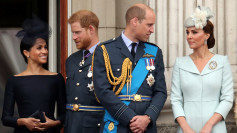The United States is keeping on its promise to tighten the lid on Iran, even before the Islamic Republic started raining down rockets on American military installations in Iraq.
On Saturday, US President Donald Trump disclosed on social media that the United States would not remove the sanctions it slapped against Iran just to negotiate.
Trump's Twitter statement was apparently in reaction to a Der Spiegel interview with Iran's Foreign Affairs Minister Mohammad Javad Zarif, who he said was still willing to talk on condition the US "correct[ed] its past" and scrap a series of tough economic measures imposed against Iran. "No Thanks!" Trump said on Twitter in English, and later in Farsi.
On Sunday, Zarif hit back on Twitter by saying an excerpt from the interview with Der Spiegel: "@realdonaldtrump is better advised to base his foreign policy comments and decisions on facts, rather than @FoxNews headlines or his Farsi translators."
The US and Iran has been embroiled in heated tensions since 2018, when Trump withdrew the US from a historic nuclear deal formalized between Iran and world leaders.
Washington has since re-implemented crippling penalties on Iran's economy while calling for negotiations on a new agreement that also tackled Iran's nuclear activities and its support for regional armed organizations.
In other developments, Iranian President Hassan Rouhani said he would resign over the downing of a Ukrainian commercial airliner carrying 176 passengers earlier this month, The New York Times reported.
Iran's Islamic Revolutionary Guard Corps, after days of being silent about the tragedy, said it unintentionally shot down the aircraft in the midst of deepening animosities with the US that have since eased in the last weeks.
Errors in communication have reportedly been the culprit that led to a military officer firing missiles at the passenger plane, thinking it was a hostile American jet.
Immediately after realizing what had actually happened, the IRGC started to cover its tracks, and refused to even tell the Iranian leader the truth for days.
Rouhani took a low profile and was said to have even refused to answer phone calls from other world leaders because he did not know exactly what to tell them. Iran's military officials also hid from public view when Rouhani tried to contact them.
When Rouhani finally knew what really happened, officials close to him told the Times that he became very angry and demanded that Iran take the responsibility and face the consequences.
Top Iranian military commanders reportedly argued with Rouhani out of worries that the news would damage the state. That was when Rouhani said he would step down as the country's president.






